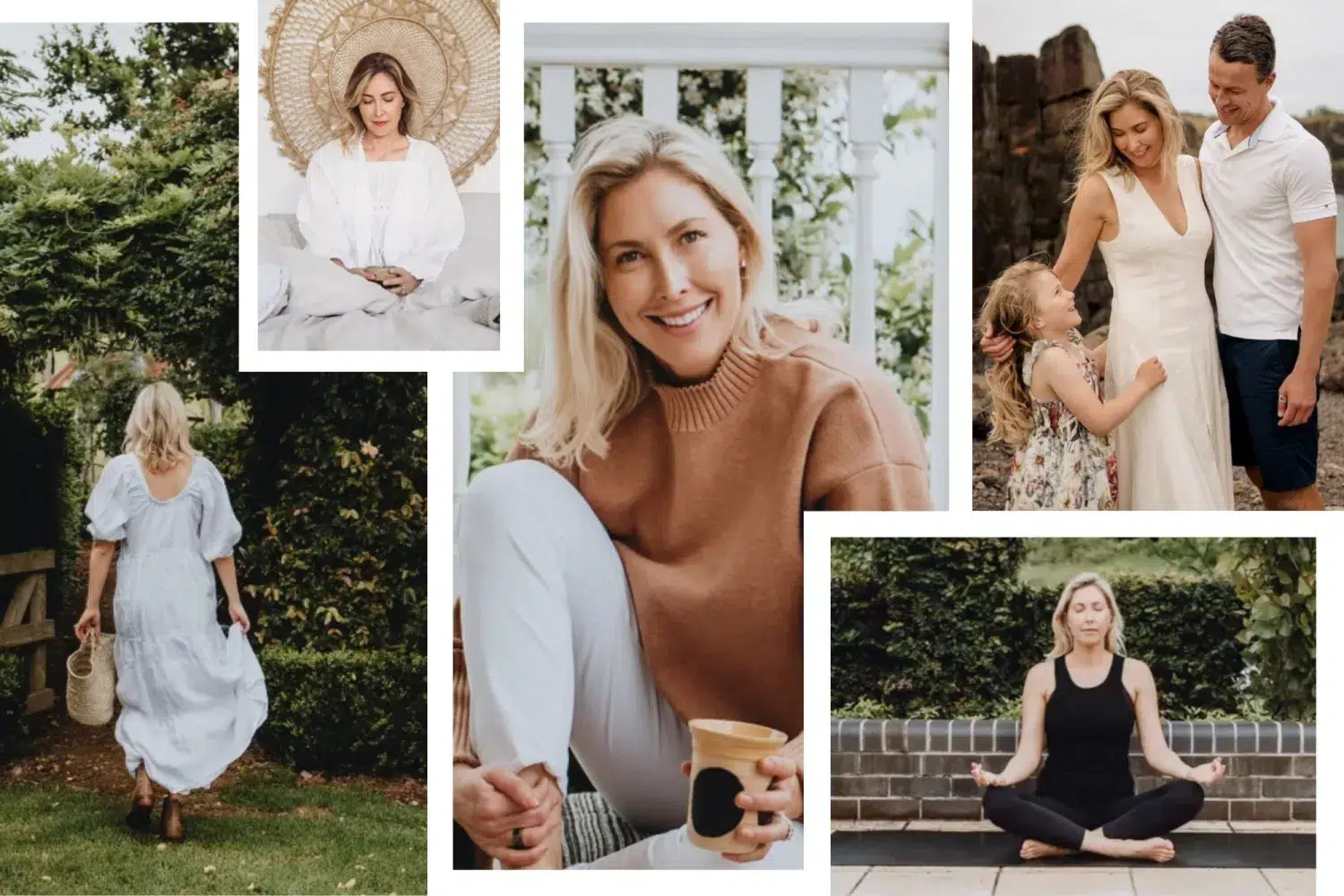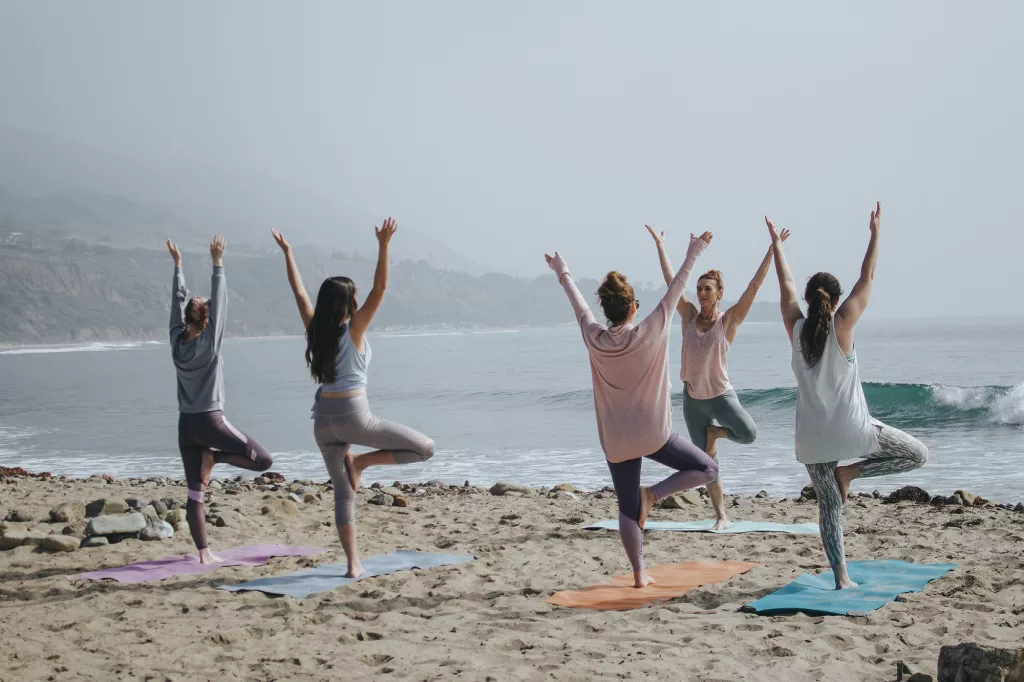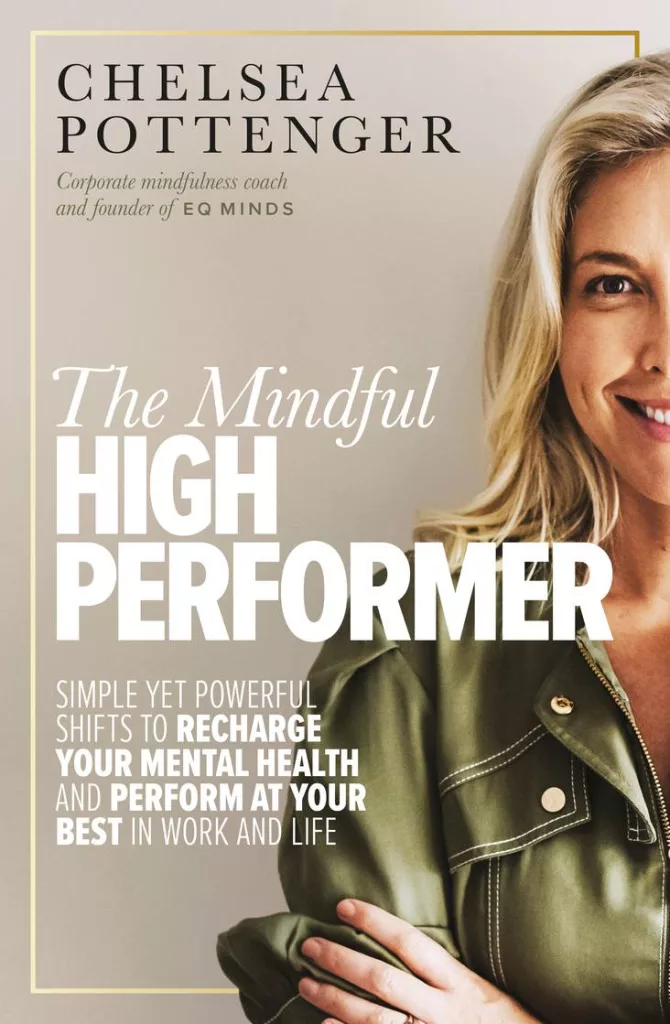When you wake up, do you instantly reach for your phone? You’re not the only one. Chelsea Pottenger shares her morning routine with us to help us all become healthier and feel happier.
By Chelsea Pottenger
LET ME GUESS … your morning routine often looks like:
- Wake up
- Reach for your phone
- Cycle through emails, social media, news and texts
- Get up and use the toilet
- Brush your teeth
- Make yourself a coffee
- Shower and get dressed
- Head to work while munching on a piece of toast
Before I had postnatal depression, that’s exactly what my morning routine looked like. The reality is, when we pick up our phones before even fully opening our eyes, we don’t give ourselves a chance to have a great day.
Nothing derails us faster than a stressful work-related email. A murder on the news. Not enough comments on our socials. Or the unspoken comparison game we play with others. There’s a reason why it’s called doomscrolling.
When I was finally ready to heal after having Clara, my morning routine was one of the first things I set out to change.
“While not every day goes to plan, I have been sticking to some version of the [same] routine for a few years now and love how calm I feel when I wake up, how focused I am when I start my day and how grateful I am when I end it.”
According to a Facebook-sponsored study done by IDC Research, 80 per cent of all respondents reached for their phone within the first 15 minutes of waking. That number climbed to 89 per cent among people aged 18–24. A similar study at Nottingham Trent University found that the average 18–33-year old checks their phone an astounding 85 times per day.
In a study investigating the effect of the emotional content of television news programs on mood and the catastrophising of personal worries, results showed that 14 minutes of watching negative news results in an increase in anxiety and has an impact on our mood. (Duh!)
I don’t know anyone who learns about a national disaster on the news, does a fist pump and then shouts, TODAY IS GOING TO BE A GREAT DAY. The reality is, these stories never make us feel good. Yet we are addicted to looking at them. A lot of us are addicted to our phones and televisions, and it’s bad for our health.
While there is very much a time and a place for catching up with friends, family and current affairs, it’s not something you should be doing before you’ve even had a chance to put your feet on the floor for the day.
MORNING RITUAL AUDIT
Take a moment to journal the things you do before heading to work or starting your day at home. Place a Y next to the activities that give you energy and an N next to the ones that deplete you.
MORNING RITUAL AUDIT EXAMPLE
- Scroll through social media
- Check work emails
- Drink water
- Watch the news
- Have breakfast
- Get ready
- Commute to work
Which of the things that deplete you could you remove entirely? (The answers are social media, work emails and news!) What about the things that deplete you, but you can’t really change? Could you reframe your thoughts around the way they make you feel? For example, try changing your inner monologue from I have to commute to work to I get to spend an hour in the car listening to my favourite podcast.
Remember Dr Lucy Hone’s strategy of asking yourself, Is this helpful or harmful? When examining your morning routine, take a moment to ask yourself if each ritual is enriching your life or negatively impacting it.
For example, does reading the news really help you start your day? If you’re a journalist or specifically following industry news, then probably yes. But if you’re someone who doesn’t really need to know all the details before work, I suggest limiting your exposure. This will help you stay more mindful and focused.
MAKE A HEALTHY MORNING ROUTINE
Throughout my journey to adopt sustainable high-performance habits, I’ve read a lot of research, listened to gurus from around the world and road-tested numerous routines in an effort to live my optimal life.
While not every day goes to plan, I have been sticking to some version of the following routine for a few years now and love how calm I feel when I wake up, how focused I am when I start my day and how grateful I am when I end it.
Please don’t feel like you need to do every single one of these things but know they’re always there for you to try.
My typical day starts at 6.30 am. These are the simple rituals I have embraced:
- Wake up naturally if possible or use an alarm that’s not on my phone
- Don’t check my phone when I first wake up
- Practise 30 seconds of gratitude before I get out of bed
- Set an intention such as: Today is going to be a beautiful day
- Make the bed
- Brush my teeth with my non-dominant hand
- Drink a tall glass of water
- Take a probiotic for my gut health
- Get sunlight onto my skin and eyes
- Do some sort of movement or energy work
- Take a cold shower
- Practise meditation
- Review my vision board and goals for the day
- Eat breakfast
You’re probably thinking, Okay, Oprah, that’s a lot before 8 am. I know, I would have thought that, too. But I swear these rituals don’t take as long as you think. AND once you do start to form these habits, you’ll feel so much better and energised for the day that you may find yourself waking up earlier to give yourself even more time for intentional self-care!
Still suspicious? Let me make my case for starting the day with self-care.
Waking Up (Without Your Phone)
It’s pretty hard to avoid the cycle of checking your messages, missed calls, social-media notifications and news apps when your phone is your alarm clock. If you’re someone who needs an alarm to wake you up, I suggest leaving your phone in the kitchen and getting a clock for next to your bed.
If you’re someone who knows they have little self-restraint, I also suggest either filing apps deep in your phone or deleting them entirely. You don’t have to keep them deleted. But if your intention for the day is to stay focused on a work goal, it’s best to get rid of any potential distractions.
You can always treat yourself to an hour of uninterrupted Instagram time in the evening.
Gratitude
Gratitude blows my mind.
Essentially living in a state of appreciation of what you value, gratitude can help you acknowledge, embrace and celebrate what and who you have in your life. The more I look into the research of gratitude, the more I realise it totally rocks.
The real power of actively expressing gratitude is that it makes you focus on what is working in your life. Happy people understand they are fortunate in some part of their life. Whether it is their family, their health or simply the sun shining on their face.
The best things about cultivating gratitude are that it doesn’t cost any money. It doesn’t take much time. And it is scientifically proven to have numerous benefits.
Gratitude researcher Robert Emmons has found links between gratitude and wellbeing. His research confirms that gratitude effectively increases happiness and reduces depression. Other research shows that people who are truly grateful experience fewer aches and pains. They’re also more likely to take care of their physical health and attend regular check-ups that likely contribute to longevity.
According to a study done in collaboration with the University of California San Diego, having a focus on gratitude increases the activity of the parasympathetic nervous system and decreases inflammation markers. Which is important because inflammation is a precursor to loads of illnesses.
Perhaps the least surprising: when we express gratitude for our friends, family and colleagues, we sleep better at night. We have higher self-efficacy. And are generally happier humans.
Gratitude and Sleep
If you are struggling to sleep, research shows that if you spend 15 minutes before bed journalling about things you are grateful for, it will reduce negative thoughts. Which helps you sleep better. After doing this for a few weeks, check in and notice if you are having better-quality sleep.
Gratitude and Relationships
Dr Martin Seligman is considered the guru of positive psychology. He says that writing and sending (or reading) a gratitude letter to someone you care about, such as a teacher, mentor, child, friend or partner, dramatically improves life satisfaction scores and happiness. As well as decreases symptoms of depression.
One way I practise gratitude is by writing Clara a love letter every year on her birthday. I use an amazing online company that posts them to our mailbox and even puts a gorgeous stamp on the back so I know what year we are up to!
I always include three things I have especially loved about Clara in the past year and am grateful for. When this card arrives in our mailbox, I place it in a keepsake box that I will give to Clara when she is 21 years old.
She will then have 21 love letters from me to her on her 21st birthday. That surely has to beat a pair of new shoes?! I thought about giving it to her on her 18th. But I’m 99 per cent sure she may not care as much then. Even writing the card alone gives me a serotonin and oxytocin hit.
Gratitude and Your Mood
Gratitude also helps us overcome worry or negative emotions we might carry with us during the day. Try being pissed off and grateful at the same time. Or angry and grateful simultaneously … it’s impossible! That’s because, according to neuroscience, we can’t focus on positive and negative feelings at the same time.
Neuroscientist Alex Korb says that practising gratitude is like taking your brain to the gym. Just as when you go for a run you get a ‘runner’s high’, it’s the same thing with gratitude. You get a release of dopamine, the reward chemical, which makes us want to hunt down that feeling again. And we begin to make it a habit.
Once you start seeing things to be grateful for, your brain starts to look for more things to be grateful for and it becomes a recurring cycle.
IDEAS FOR PRACTISING GRATITUDE
- Silently or audibly express your gratitude before getting out of bed (instead of checking your phone!).
- Keep a gratitude journal at night (instead of doomscrolling!).
- Write a love letter or thank you card to a friend, child, client or spouse.
- Post inspiring quotes around your office, kitchen or bedroom.
- Write little daily gratitude notes and keep them in a gratitude jar.
- Commit to a gratitude month photo series where you capture a photo each day of things that make you happy.
- Watch inspiring videos.
- Wear an elastic band and whenever you notice a negative thought, snap the elastic band and replace the thought with one about what is going right in your life.
- Do a guided gratitude meditation.
- Express gratitude to a friend in specific terms.
- Conduct acts of kindness for your neighbours or strangers.
- Experience gratitude through volunteer work.
- Silently or audibly list things you are grateful for while you wait for the kettle to boil. Are stuck at the traffic lights. Get ready to eat a meal. Are in the shower. Or sit in a waiting room.
Set Your Intention for the Day
If you’ve been rolling out of bed and starting your day with a sigh and a sense of dread, I want you to commit to setting an intention for your day.
One of the most insightful things I’ve learned from my research is something Dr Daniel Amen speaks about in his book, The End of Mental Illness. According to Dr Amen, we should start our day by opening up the curtains and saying, ‘Today is going to be a good day!’ Sounds so simple, right? Even a child could do it. (And yes, they should.)
As soon as you wake. Before you check your phone. Try saying ‘Today is going to be a good day’ out loud when you are opening up your blinds.
When you focus on the positive, your brain will start to uncover all the reasons it’s going to be that way and stimulate the happy chemicals. Dr Amen explains that where our attention goes, our energy flows and by making that simple declaration, you’re setting a positive tone for the day.
According to Dr Amen, when we have a happy, hopeful or empowering thought, our brain immediately releases serotonin, oxytocin and dopamine. When we have these happy chemicals coursing through our veins, our breathing slows and our muscles become more relaxed.
Setting an intention is like drawing a map of where you want to go. It becomes the driving force of your higher consciousness.
Make sure your intention has a positive tone. If your intention is to be happy, then try to say something like, ‘Happiness is my natural state.’ Try to avoid, ‘My intention is to not be miserable today.’
Change Your Morning with These Daily Positive Affirmations:
- I am thankful for all that I have
- Everything happens for a good reason
- I accept myself just as I am
- Today I choose to be confident
- I believe in me and have confidence in myself
- I am in control of my thoughts, feelings and choices
- I deserve a happy heart and to live at ease
- I am living in total abundance
- I am proud of myself and all that I have accomplished
- I know good things will continue to come into my life
- I deserve the best and accept the best
- I am grateful for all new experiences
Make Your Bed
One day, my mentor sent me a video by Admiral William McRaven called ‘If you want to change the world, make your bed’. Funnily enough, my mum drilled bed-making into me from the age of five because that was good manners. Unbeknown to mum, she was gifting me one of the keys to a happier life.
Why Making Your Bed Is Important:
- You start off your day with a win
- It reinforces in life that the little things matter
- Doing the little things right sets you up to do the big things right
- If you have a bad day, you will come home to a bed that is made
- Research shows that making your bed helps with productivity and emotional wellbeing
Brush Your Teeth with Your Non-Dominant Hand
Given the nature of my personality, in periods of idle and quiet time, my mind has a tendency to run counter to mindfulness. I sometimes get too swept up thinking about the future or multi-task in ways that pull me away from my present experience.
When I’m running on autopilot, I tend to forget things like my keys, computer bag or water bottle because I’m not paying attention. Studying mindfulness has made me realise the significance of cultivating conscious, non-judgemental awareness.
Studies show that practising mindfulness calms the mind. Improves brain function. Helps you focus. And reduces stress.
It makes people happier, less irritable and more engaged with others. One highly effective way to practise mindfulness is through meditation. However, a task that is simpler in the morning is brushing your teeth with your non-dominant hand.
I brush my teeth with my left hand to jolt myself out of internal chatter and stay in the moment. It also trains my brain to do tricky tasks while stimulating a different part of my brain. This tool will help you to avoid falling into mechanical thoughts and actions. It will also leave your mouth feeling fresh and clean!
Hydrate
When we sleep, our bodies are hard at work repairing muscles, recharging our immune system and shedding toxins.
One of the best things you can do to help your body complete its night-time detox cycle is to drink a tall glass of water when you wake up. This helps flush out toxins and hydrate our bodies. Hydration is also important first thing in the morning because our bodies lose a lot of water while we sleep through breathing and sweating.
Did you know that our brains are 80 per cent water? That means if we want to fire up our brains to operate at top functionality, we need to be well hydrated.
Even if we are mildly dehydrated, it can have an impact on our mental health. Making us feel anxious, tense or even depressed. As well as thwarting our energy. So, grab a tall glass of water before you reach for your morning coffee.
Take a Probiotic and Prebiotic for Your Second Brain
Have you ever noticed that when you’re feeling a strong emotion, it’s almost as if it’s happening in your stomach? I feel sick to my stomach. I have butterflies in my stomach! I feel like I’ve been punched in the gut.
Your enteric nervous system is the boss of your gastrointestinal tract. Consisting of hundreds of millions of neurons, it’s responsible for your body’s motor functions, blood flow and mucosal transport (e.g. the tissues that produce mucus, such as the digestive, genital and urinary tracts) as well as controlling immune and endocrine functions. It’s also the maestro of peristalsis, the contraction that moves your poo closer to the exit!
Often referred to as the body’s ‘second brain’, your enteric nervous system is connected to your (actual) brain by the vagus nerve.
It’s also responsible for making 90 per cent of our serotonin and 50 per cent of our dopamine. Serotonin is vital for positive moods and good energy. While dopamine fuels our motivation, sense of reward and general feelings of happiness.
For a long time, scientists thought these were only manufactured in the brain, but it turns out they also come from our gut!
Because the gut acts as a home base for neurotransmitters, you can see how mental-health conditions like depression and anxiety emerge when there is a problem in the gut. There is a tremendous overlap between irritable bowel syndrome (IBS) and depressed mood and anxiety.
For decades, doctors did not understand that the root of a patient’s anxiety or mood swings could be a gastrointestinal issue. It’s now clear that when you have damaged gut bacteria, you can suffer from reduced serotonin levels, which then alters your mood.
Probiotics have been shown in clinical studies to decrease inflammation. Which improves gut health. And they are even more effective when taken with prebiotics. Experts suggest looking for products you can take daily that contain both lactobacillus and bifidobacterium strains and over 3 billion live organisms.
Safely Get Some Sun
Thanks to skin cancer, the sun has been having a lot of well-deserved bad publicity lately. But it’s something we should be actively seeking out in order to maintain our body’s circadian rhythm.
Designed to tell our bodies when to produce cortisol and when to produce melatonin, our circadian rhythm is directly impacted by our eyes’ light consumption, especially blue-light wavelengths. These wavelengths are found in natural sunlight as well as artificial lighting and screens (e.g. smartphones, tablets, computers and TVs).
While blue-light wavelengths are great because they help us feel alert, energetic and ready for the day. When you’re exposed to them for too long (like sitting in front of a computer screen until 9 pm at night), your body doesn’t get the signal to make melatonin.
I want you to focus on exposing your eyes to sunlight first thing in the morning. So your body knows to start scaling back on producing melatonin and ramping up cortisol.
Why you need to get outside…
But Chelsea, you just said I could get blue-light wavelengths from staring at my screen. Do I actually have to go outside?
Yes, you actually have to go outside. And here’s why: the lux, which is the unit of measurement of light level intensity, is better.
- A dark room has a lux score of 0
- An artificially lit building has a lux score of between 500 and 1000
- Outdoor sunlight can have a lux score of between 30,000 and 110,000 (2000 on a cloudy day)
Let’s say you’re living in London and travelling to work before sunrise and from work after sunset. You go from your flat to the tube to the office and back home again. If you’re not stepping into sunlight once the sun is up, you’re missing the part of the day that is designed to kick off your body systems.
With that being said, many of you would argue London isn’t a very sunny place or that this simply isn’t possible for people who live in places like Iceland and Alaska. (Touché.) In that case, you can buy light boxes that are specifically designed to replicate outdoor sunlight. (Not the best option, but it beats the alternative!)
Now, I’m not saying you should go outside and stare directly into the sun. You’ll burn your retinas out! I simply mean step outside in the morning and expose your eyes to the sunlight so your body knows that it’s time to kick into gear. Below are a few ways I like to get sunlight into my eyes in the morning:
- Go for a morning walk without sunglasses
- Exercise outdoors without sunglasses
- Have my morning coffee on the balcony without sunglasses
Build Your Energy and Move Your Body
The amount of research showing just how beneficial it is to move your body (especially in the morning) is staggering. Another way I begin building my energy is by doing breathing exercises every morning.
Benefits of Regular Exercise:
- improved oxygen levels in the brain
- healthier muscle to fat ratio
- improved sleep
- decrease in depression
Have a Cold Shower
Remember the ice-bucket challenge that raised awareness for ALS (amytrophic lateral sclerosis)? Apparently, they were onto something!
Research shows that cold-water therapy does a great job at resetting your nervous system and improves mood, increases alertness. And it has the extra benefit of helping to manage inflammation. When I read this research, I gently dipped my toe into this practice.
First, I started with a three-minute warm shower and 30 seconds of cold at the end. Then, over the course of a week, I gradually increased the cold.
In Winter, I revert back to a warm shower at the start and only the last 30 seconds cold. If it’s a possibility for you, you could go for an ocean swim or take a dip in an unheated pool in the morning.
Your Morning Meditation
According to a 2013 study, over time, meditation can shrink the size of your amygdala. Which is the part of the brain responsible for stress and anxiety. This gets me really excited because if your amygdala is less reactive, you become less stressed and live more in the moment.
Science also shows that meditation improves the size of your hippocampus, which is your brain’s memory centre. (Hello, morning performance!) So even as we are ageing and getting a little saggier or developing more wrinkles, we can still stay super sharp in the brain.
If you can, try thinking about spending 10 minutes a day in a meditative state.
But Chelsea, I have small children.
I hear you. With a young child, sometimes I don’t get my morning meditation in. So on those days I schedule a non-negotiable 10-minute timeslot in my diary to meditate. This is usually either at 10 am or 3 pm. I literally book it in like I have an appointment.
Focus on Your Goals
Mornings can be the best time for productivity, which is why I always focus on the tasks that matter most to me. Begin each day by revisiting your goals and vision board so that you can set a clear intention. This will allow you to stay focused on the things that you value and keep you intrinsically motivated throughout your day.
Here’s my biggest tip: I don’t deplete my willpower on menial tasks. I do the big deep-thinking work first as I’m a lark and most productive in the morning. I don’t even check emails until 10 am.
If I allow the small tasks to creep in, I tend to get derailed and lack the clarity I need to achieve the meatier work.
Always take the time to plan your day and list the things that matter most to you in order of importance. Remember, this includes your own mental health and self-care!
Eat Breakfast (or Don’t)
Unless I’m fasting, I typically start my day with a brain-friendly meal and coffee. This could be something like:
- egg and avocado on gluten-free bread (I’m gluten intolerant)
- paleo granola, coconut yoghurt and blueberries
- smoothie
- boiled egg, spinach and toast
- apple with almond butter
- zoodles (zucchini spiralised and topped with organic herbs)
Disclaimer: everyone’s diet will look different depending on the needs of their gut health.
I want to reiterate that my morning routine does remain fluid and flexible, and I don’t do each of these things every morning!
The last thing we want is for your morning routine to cause stress if you aren’t ticking off all these items on the list. Start with one simple change that will benefit your mind and body, and be guided by what feels good for you.
IN YOUR JOURNAL
- Write a list of the things you do before heading to work or starting your day at home. Place a Y next to the activities that give you energy and an N next to the ones that deplete you.
- Every morning, write down and answer the following journal prompts:
- What is the one thing I can do today that will have the largest return on investment (financially, professionally or personally)?
- What am I doing today for self-care?
Text from The Mindful High Performer by Chelsea Pottenger. Murdoch Books RRP $32.99.



















